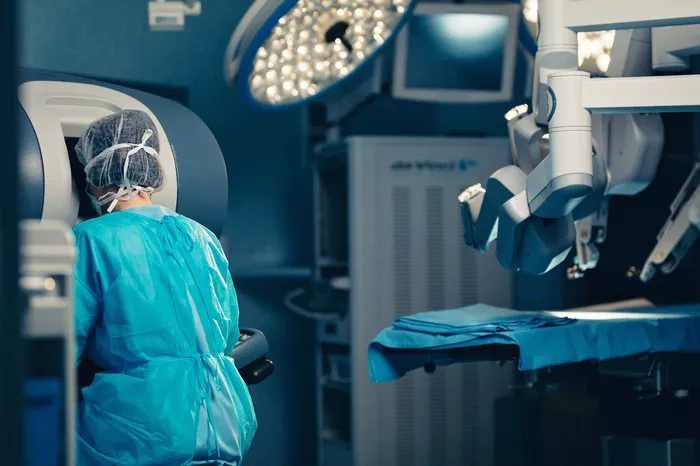The use of robotic surgery within the NHS in England is set for a dramatic rise, as health leaders unveil a long-term plan to expand the technology’s role in treating patients. By 2035, officials expect that nine out of ten keyhole surgeries will be carried out with robotic assistance—up sharply from the current rate of one in five.
In the 2023/24 period alone, around 70,000 robot-assisted surgeries were performed. That number is projected to soar to nearly 500,000 annually within the next decade, reflecting a shift toward high-tech solutions aimed at improving surgical outcomes and reducing waiting times.
Faster Recovery, Shorter Hospital Stays
According to NHS England, robotic-assisted procedures lead to faster patient recovery and reduced hospital stays. The advanced systems allow surgeons to operate with enhanced precision, using a console and camera to control robotic instruments. In some orthopaedic procedures, robots are even programmed to carry out specific parts of the operation.
Health and Social Care Secretary Wes Streeting, who underwent robot-assisted surgery during his kidney cancer treatment, highlighted the importance of innovation in transforming the NHS. “Innovative treatments and technologies that help fast track better outcomes for patients is how we transform our NHS and make it fit for the future,” he said.
Streeting praised the life-saving care he received: “I know myself how important this is, when the NHS saved my life from kidney cancer with an operation led by a world-class surgeon being helped by a robot.”
Innovation at the Core of NHS Modernization
The announcement comes ahead of NHS England’s ConfedExpo conference in Manchester, where Sir Jim Mackey, NHS England’s National Director of Elective Recovery, emphasized the critical role of new technologies in reaching the NHS’s recovery goals.
“The NHS has pledged to return to shorter elective waiting times by 2029 and we are using every tool at our disposal,” said Mackey. “Expanding the use of new and exciting tech such as robotic surgery will play a huge part in this. Not only does it speed up the number of procedures the NHS can do, but it also means better outcomes, a faster recovery and shorter hospital stays for patients.”
Robotic Surgery Expanding Across Specialties
NHS officials noted that the range of surgeries now supported by robotic systems has significantly widened, spanning across urology, gynaecology, general surgery, and orthopaedics.
John McGrath, a consultant surgeon at North Bristol NHS Trust and chair of the NHSE Steering Committee for Robotic Assisted Surgery, said robotic tools are “a perfect example of innovation improving patients’ care and transforming the way the NHS works.”
“As keyhole surgery continues to develop and scale up in the NHS,” McGrath added, “it is likely that many of these procedures will be provided with degrees of robot assistance in the future. Faster recovery and shorter hospital stays are not only hugely important benefits for patients undergoing surgery—if used efficiently, they can have a positive impact on the rest of the system by relieving pressure on services and helping to reduce waiting times.”
Part of a Larger Plan for NHS Transformation
The expansion of robotic surgery is one part of a broader strategy dubbed the “Plan for Change,” which also includes investment in AI tools for detecting conditions such as skin cancer and the rollout of a new health data research service aimed at accelerating drug development.
Streeting reinforced the government’s commitment to embracing transformative technologies: “Whether it’s robotic surgery, our new health data research service to accelerate the development of new medicines, or announcing new artificial intelligence that detects skin cancer, our Plan for Change is driving forward new ways to help cut waiting lists and get patients treated on time again.”
With demand on NHS services at an all-time high, the scaling of robotic-assisted surgery represents a pivotal step toward modernizing healthcare delivery while improving both patient outcomes and overall system efficiency.
Related topics:

